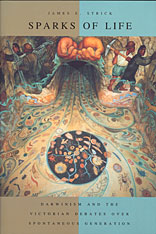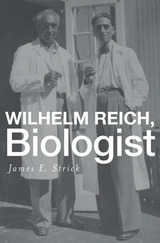
How, asks James E. Strick, could spontaneous generation--the idea that living things can suddenly arise from nonliving materials--come to take root for a time (even a brief one) in so thoroughly unsuitable a field as British natural theology? No less an authority than Aristotle claimed that cases of spontaneous generation were to be observed in nature, and the idea held sway for centuries. Beginning around the time of the Scientific Revolution, however, the doctrine was increasingly challenged; attempts to prove or disprove it led to important breakthroughs in experimental design and laboratory techniques, most notably sterilization methods, that became the cornerstones of modern microbiology and sped the ascendancy of the germ theory of disease.
The Victorian debates, Strick shows, were entwined with the public controversy over Darwin's theory of evolution. While other histories of the debates between 1860 and 1880 have focused largely on the experiments of John Tyndall, Henry Charlton Bastian, and others, Sparks of Life emphasizes previously understudied changes in the theories that underlay the debates. Strick argues that the disputes cannot be understood without full knowledge of the factional infighting among Darwinians themselves, as they struggled to create a socially and scientifically viable form of "Darwinian" science. He shows that even the terms of the debate, such as "biogenesis," usually but incorrectly attributed to Huxley, were intensely contested.

Psychoanalyst, political theorist, pioneer of body therapies, prophet of the sexual revolution—all fitting titles, but Wilhelm Reich has never been recognized as a serious laboratory scientist, despite his experimentation with bioelectricity and unicellular organisms. Wilhelm Reich, Biologist is an eye-opening reappraisal of one of twentieth-century science’s most controversial figures—perhaps the only writer whose scientific works were burned by both the Nazis and the U.S. government. Refuting allegations of “pseudoscience” that have long dogged Reich’s research, James Strick argues that Reich’s lab experiments in the mid-1930s represented the cutting edge of light microscopy and time-lapse micro-cinematography and deserve to be taken seriously as legitimate scientific contributions.
Trained in medicine and a student of Sigmund Freud, Reich took to the laboratory to determine if Freud’s concept of libido was quantitatively measurable. His electrophysiological experiments led to his “discovery” of microscopic vesicles (he called them “bions”), which Reich hypothesized were instrumental in originating life from nonliving matter. Studying Reich’s laboratory notes from recently opened archives, Strick presents a detailed account of the bion experiments, tracing how Reich eventually concluded he had discovered an unknown type of biological radiation he called “orgone.” The bion experiments were foundational to Reich’s theory of cancer and later investigations of orgone energy.
Reich’s experimental findings and interpretations were considered discredited, but not because of shoddy lab technique, as has often been claimed. Scientific opposition to Reich’s experiments, Strick contends, grew out of resistance to his unorthodox sexual theories and his Marxist political leanings.
READERS
Browse our collection.
PUBLISHERS
See BiblioVault's publisher services.
STUDENT SERVICES
Files for college accessibility offices.
UChicago Accessibility Resources
home | accessibility | search | about | contact us
BiblioVault ® 2001 - 2024
The University of Chicago Press









